Fire Emblem
Hrm. Tum te tum. How to get you interested... Ah yes: The natural successor to Advance Wars. Anyone?
Shop for games now with Simply Games.
A few hours in to Fire Emblem, apprentice tactician SirMugs (that's your humble reviewer right there) and his saviour Lyn, an orphaned warrior-in-the-making from the Sacae Plains, have joined forces with a pair of knights, the chivalrous Kent and his headstrong brother in arms Sain, and they're all on their way to Caelin - one of the several kingdoms of Lycia. All of a sudden, the group is thrust into a battle on the edge of a forest, at which point a pair of young sorcerers appear - the quiet, dedicated Erk and his rather dotty charge, Serra - and offer their services. With their help, the battle is won, and 'Lyn's Legion' grows to benefit from the duo's magical prowess; and the amusing juxtaposition of mild-mannered fire-wielder and tempestuous healer returns to tickle us from time to time in manga-style static image cut sequences from thenceforth.
Advance Fantasy
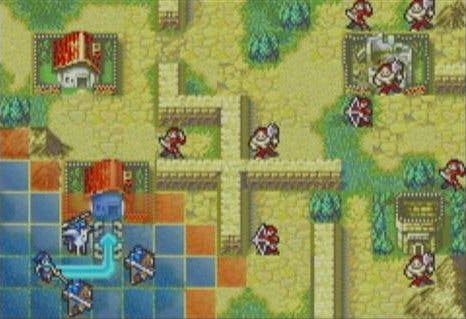
We've long harboured a fondness for Japanese RPG stories around here. And of course the snapshot-of-a-tale above is not all that dissimilar from the meandering yarns of a hundred other RPGs old and new, and we dare say the manner of that sort of Japanese fantasy storytelling won't grow to become obsolete any time soon either. However, like a mounting number of RPG fans these days, we've recently found ourselves increasingly jaded about the underlying mechanics of such things. Final Fantasy detractors in particular will probably already agree, but even the most ardent supporters of random battles would probably also have to admit that, from time to time - in their darkest moments of self-doubt - there is an element of 'playing on just to see what happens in the plot' in an awful lot of turn-based role-players these days - even the most celebrated.
It's a worrying thought, but not a shameful one; in fact we reckon there are plenty of people in a similar position. Which is why we're delighted to finally be playing a Fire Emblem game in these parts. Because while the storyline of the first Fire Emblem game ever to appear in Europe shares many of the characteristics of the best Japanese RPG storylines we've ever embraced, and indeed of the character-based progression of such titles, developer Intelligent Systems eschews role-playing convention and instead builds a game not dissimilar in mechanics to its universally acclaimed Advance Wars series. The result here is an enviable blend of turn-based strategy and RPG elements. In other words, it's exclusively battle-based, rather than exploration and battle, but it's matched to a story and sense of growing experience that fans of Japanese RPGs will doubtless take to with great fervour.
It all works quite simply. Spread around the battlefield, which may be a few screens wide or tall, are your blue allied units, red enemy units, and green 'other' units, which may be characters to protect, NPCs to forge alliances with, or what-have-you. Your goal varies, but generally the idea is to wipe out the opposing force and/or seize some objective. You do this by moving units around, and working out how best to dispatch the enemy whilst trying as hard as possible to preserve the health of your own units, each which you retain from battle to battle rather than simply rebuilding your force again and again when they're beaten down. While this is going on, you're also visiting villages and houses to seek out information and buy items, and even having little discussions with one another on the battlefield. After the battle, there will be some more discussion, perhaps some change in personnel due to narrative events, and then a few more steps on the path towards your goal - after which you'll happen upon another encounter that requires a delicate measure of brute force to overcome.
Recycling Proficiency
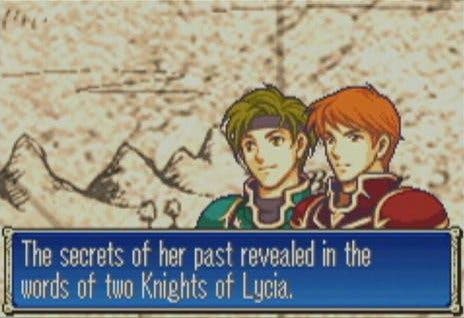
It's a distinctive blend of existing ideas, then, and whatever its influences, ultimately that means there's a lot to take in. But as veterans of the two Advance Wars campaigns are doubtless already aware, Intelligent is quite proficient in imparting details of complex systems without confusing or overloading the player, and an extra layer of persistent narrative hasn't forced them off the rails. Indeed, if anything, it's actually led to an even better handling of the learning aspect of the game.
Effectively what the team has done is integrate the tutorial into the first nine chapters (battles) of the game, and as a result they've tackled the tricky tasks of introducing us to key protagonists like your commander Lyn, outlining the story and history of the region, and showing us how to handle everything - all in one fell swoop. As you guide Lyn on her increasingly inexorable path to Caelin, you'll get to grips with movement, fighting, the weapon triangle (lance defeats sword, sword defeats axe, axe defeats lance), and how things like differing terrain affect combat. Handling the learning process this way also means that certain more advanced elements can be introduced as new characters flock to Lyn's banner - giving you gradual exposure to diverse hand-to-hand, ranged, magical and even thieving components of your force.
It's a largely seamless process, and it means that by the time you emerge from the relatively straightforward first stretch of the game, not only have you learnt how to play it, but you've developed an affection for the characters, and gradually learnt to appreciate the bigger tactical picture rather than having it all forced upon you in one mighty splurge. Oh, and you can also turn off the pop-up tips element by pressing the Select button, clearing the path for any repeat plays.
Death of a Swordsman
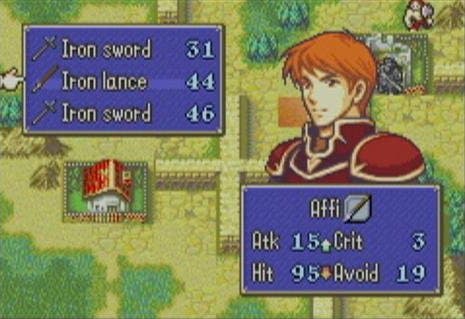
By the same token, integration of the storytelling is also seamless. Plot segments play out both on the battlefield and off it as you encounter new characters and information, and the cutaway voice bubble-based manga cut-scenes, though they may be basic, nevertheless convey a lot of character and humour and weave an enjoyable yarn. This is helped to a certain extent by the absence of pre-scripted lines for the player, too - your role is as tactician, and although you may see yourself as a physical unit from time to time before and after battle, you have no dialogue to, er, speak of, and no physical form in the grip of battle. As with games like Half-Life and Zelda, the absence of scripting helps you to imagine a role for yourself, and you feel like you're developing relationships with characters in spite of your silence.
The RPG elements feel like they belong too. Levelling up units and weapons, taking on side quests (or not) that potentially bring even more diverse units and expanding narrative elements, and visiting the likes of armouries and other shops to restock degrading weaponry and potions on appropriate turns, all feel like they belong. You generally sacrifice a turn to do things like visit a village - a trip that may not even result in any tangible gain - but it doesn't feel like a trip wasted. Often it feels like something you had to do, and fleshes out background on your enemies in battle; for example, informing you that the ruler of the lands is a dishonourable lecher.
Another key RPG element is the persistent characters, and how their 'deaths' in battle are handled - and again it's a snug fit. Allies may fall in battle, but obviously - despite a little branching here and there - they are sometimes required elsewhere in the narrative. Clearly this presents a problem, because not everybody is going to be happy having to start over every time someone dies late in the day. With this in mind, Intelligent has fashioned a system that won't force you to restart unless one of your central characters (like Lyn) is beaten, but will leave you at a severe disadvantage in future battles by robbing you of a fallen unit's involvement in battle. They remain in your company in a diminished role for the needs of the story, but they are for all intents and purposes gone from your party. You'll probably find you make use of the game's three save slots in these scenarios to see whether you miss them in the next fight, then replay the preceding mission if you do. And, fortunately, it's not the end of the world if you do have to; the balance of the turn-based gameplay is sufficiently precise that it's rarely a chore to retread your steps. Indeed, in many cases it's an opportunity to hone your tactics, and make different decisions at other equally pivotal points.
Good Fortune
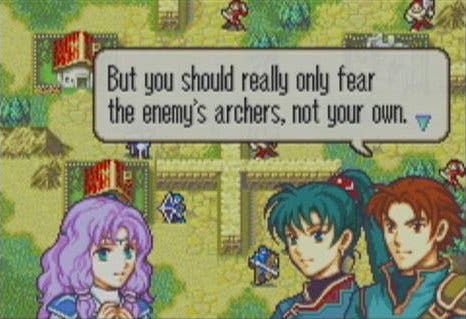
With Lyn's tale and the tutoring aspects out of the way though, we had worried slightly that the game might peter out into either a fairly enjoyable, fully stocked endgame (think skirmish mode in most RTS titles), or worse just rehash itself over and over. But then we are creatures of very little faith. Of course what actually happens befits the developer's name - you take control of a different central character, Lord Eliwood, in a different area of the same world. And not only are there still plenty of things to learn about, like class changes, the Trinity of Magic (think of it as the weapon triangle for the black arts) and advanced tactics, but there's also another band of characters to embrace. And, best of all, while you're doing this you'll find that you cross paths with old friends, which adds an element of sentimentality that you so often miss in RPGs and adventure games - a bit like having a sequel within the same game. It's a wonder more people don't do this, because it's a delight to find yourself growing an affection for your party and then run into somebody from the old guard who gives your heart a little jump and makes you blurt something like, "Oh cool, he's back!" We certainly can't recall another strategy game where we were just as keen to go over to somebody on the battlefield and say 'hello' as we were to vanquish our adversaries and reclaim our heritage...
As you get to this stage, you also really start to let loose and hone your strategies, and discover that the whole affair is not as rigidly structured as the tutorial perhaps implies. Indeed, generally you find yourself betraying the guidelines to conquer enemies with depleted health, and a careful examination of the stats or chat with your fortune-teller may lead to picking a differing party line-up to the one you anticipated. All of this variation does mean that there's a certain amount of replaying to be done (as you tend to want to avoid moving on when characters have fallen in battle), but the pace of the game means you can always see where you went wrong, and learn from it - and by the end you'll certainly be thinking two or three steps ahead of the move you're actually making as a result, as the margin for complacency grows narrower and narrower.
The March of War
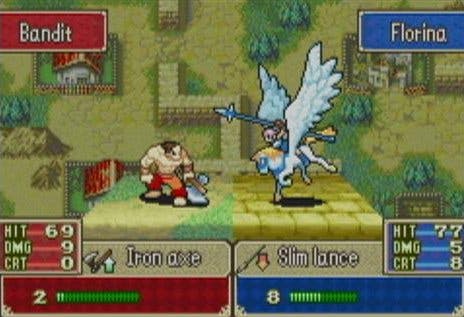
What's also good is that the campaign remains varied - thanks to changes in enemy unit types, terrain, the inclusion of other types of scenario like defending forts and units and finding secret entrances, and even options for different strategies on the same map. You might, for example, just take the obvious route over a couple of bridges and bludgeon your way through the bulk of the force. Or, if you're clever, you might knock down some trees to ford rivers further up, giving you a different angle of attack (and sometimes some different, profitable new locations to visit on the way). The difficulty isn't a perfect curve - there are certainly missions midway through that prove a lot harder to make it through with all your allies intact than others further on - but on the whole if you're tactical enough, you won't find yourself outfought, and you'll probably appreciate the occasional spike as if it were a reality of battle.
It is, in other words, just as much your love of playing that keeps you going - in stark contrast to so many story-driven adventures and role-players of recent history - as it is the narrative hooks. They combine, really, to propel you onward, and the mixture is just as absorbing as a clash of Advance Wars and Japanese RPG narrative probably sounds like to fans of both. It's precisely measured, and yet there's room for freedom of military expression, and despite its depth the way the tutoring is handled means it's never unwieldy - all the while you're fighting for a cause, and trying to piece together and knock down a conspiracy that you're genuinely interested in overcoming.
Ultimately, there isn't a great deal to be said against it. Even the presentation is top drawer. The graphics are necessarily a touch basic, but wherever it can excel it does. Animations on the battle screen (which overlays very smoothly and quickly) are pretty impressive for the handheld, and have a certain charm about them as well - particularly the riders, if you ask us - and the manga sequences are full of likeable looking characters, whose single-shot models are often expressive enough to back up any of the generally very well translated dialogue without leaving gaps. Even the score is surprisingly catchy - the battle themes, map themes, and various other tunes used in cut-scenes are never annoying, and at their height they're an indispensable accompaniment...
Step Back
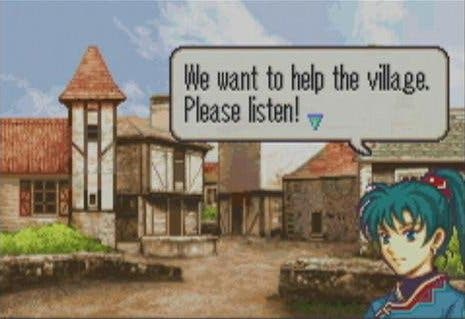
But sadly, while there isn't a great deal to say against it, there is something in particular. We're not all that bothered by minor tears in the fabric, because they don't really interfere with your enjoyment of it, and are often your fault anyway. (Having to hunt around a map for the final unit, for example, may take another minute or so, but whose fault is it if you can't see under the fog because you either forgot to bring the thief with his sharper eyes or didn't buy a torch?) What we are a touch concerned about is that for a turn-based strategy title from Intelligent Systems, Fire Emblem is worryingly tedious in multiplayer.
Stripped of its storytelling, all that remains is a chess-like multi-cartridge game of clobbering your adversaries, and, while it's certainly tactical, it's not a patch on what's come before, and disappointing as a result. Taken on its own merits it's probably worth trying out, but we've come to expect something more from Intelligent Systems, so there you go. It's not really a case of it failing to live up to our preconceptions, either (because we're obviously mindful of that) - it's more that such a pedestrian exercise doesn't befit the meticulous design on display elsewhere. Meticulous design like a 'suspend' system that lets you switch off and resume the game mid-battle, but won't let you switch off and resume from a turn earlier to try and cheat your way out of a cul-de-sac.
Step Ahead
Still, we can live without multiplayer in this case, whatever the legacy of the developer. Because what Intelligent Systems has delivered is a single-player adventure with as much narrative tether and longevity as the average Final Fantasy game, despite the complete lack of high-end CG cut-scenes and expensive voice talent, not to mention the darting around talking to people and juggling of Phoenix Downs. It's a game with real heart that fans of Japanese RPGs can't fail to fall in love with. It's also the best turn-based title on the Game Boy Advance since the original Advance Wars, and we have a feeling that anyone with a penchant for that (that's all of you, right?) will take to this like a Japanese character designer takes to spiky haircuts. Which is excessively. Brilliantly paced and executed throughout, Fire Emblem ought to become a beacon for others to follow.
Shop for games now with Simply Games.








